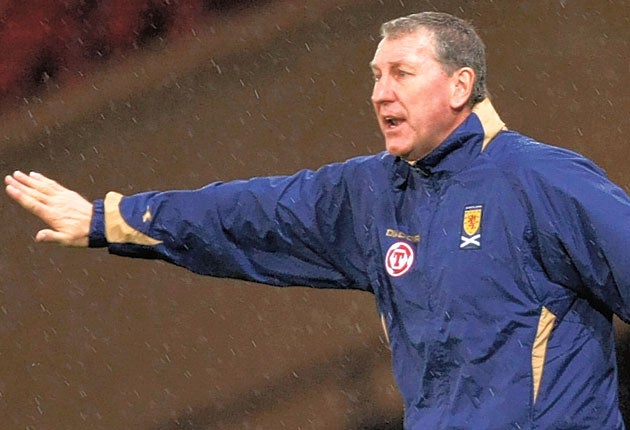Terry Butcher: Reward for all the blood, sweat and tears

Terry Butcher's body is finally succumbing. During the World Cup finals in June, the former England captain will be lying in a hospital bed recovering from surgery on his right knee. The left has already been replaced. He played as though his limbs were simply tools at his disposal, so the frailty does not disconcert him. After all, Butcher remains defined by images of valour.
There was a time when, every few weeks, his mail would contain requests to sign the photograph of him with a bandage wrapped around his head and blood splattered across his England jersey. It is a picture that captures the essential fearlessness of his approach to defending. He carries an almost manic look as he leaves the field after a 0-0 draw with Sweden in 1989, when he received seven stitches to a cut above his left eye at the interval, and 13 at full-time.
He remains an iconic figure, even if there is less personal inclination to dwell on his past. It was 20 years ago that Butcher led England to the World Cup semi-finals, and a film is being made based on Pete Davies's book All Played Out, which tells the inside story of the journey of Sir Bobby Robson's side to a penalty shoot-out defeat by West Germany.
Butcher is a more complex individual than he was when his world was divided into those who were with England and those who were against. He was a fundamental influence, a staunch, passionate captain. He used to listen to heavy metal music before games; every match was an opportunity to express his patriotism. His feelings are more nuanced now.
He remains an England supporter, but has spent 19 of his 51 years living north of the border and was Scotland's assistant manager under George Burley for 22 months. He works now in Inverness, where he has just led Inverness Caledonian Thistle back up to the Scottish Premier League. He should be a conspicuous figure but Scotland has mostly come to consider him something of a native.
"I get it from Maurice Malpas [his assistant manager] every day," says Butcher. "He has 55 caps for Scotland and he slaughters me every day for being English. We have a few English boys in the squad, so there's great banter in training. But I love it here. It's not really a football city. It's very quiet. You can drive from one side of Inverness to the other in 10 minutes unless it's rush hour, when it takes 11 minutes."
The humour has become typical of Butcher. He often responds to victory or defeat by referring to how many glasses of red wine he will have in the evening. After filming an advert for Mars, he received a box of the chocolate bars at the club but said the players wouldn't open them because the wrappers bore an England crest.
The England team matters to Butcher but in a detached way. He admires Fabio Capello but is uncertain of the impact England can make in South Africa. Twenty years on from Italia 90, he is not convinced that Robson's team can be emulated, let alone bettered. "England have an outside chance at best," he says. "There's nobody apart from Wayne Rooney who catches your eye and who's playing particularly well. If teams are going to stop Rooney, the spark is going to have to come from somewhere else."
His mind is on frivolities. Inverness are celebrating and are only the second club since Hibernian in 1999 to bounce straight back from relegation. The triumph is collaborative, but it is Butcher's first trophy as a manager and so it seems intensified to him.
Five years at Motherwell, where he nurtured a group of promising young players and led them to cup finals and the top six of the SPL, were prosperous. At Coventry, Sunderland, Brentford and Sydney, he was eventually sacked. Adversity has always provoked the best from him. When a newspaper columnist wrote that he wasn't good enough to play for England, he cut out the article and used it as a bookmark.
"In the good times, you tend to forget about all the bad things that have happened," he says. "I made mistakes. We brought a number of players here who needed a second chance and they responded. It's a beautiful place, friendly, and once you're here, you want to stay."
Join our commenting forum
Join thought-provoking conversations, follow other Independent readers and see their replies
Comments